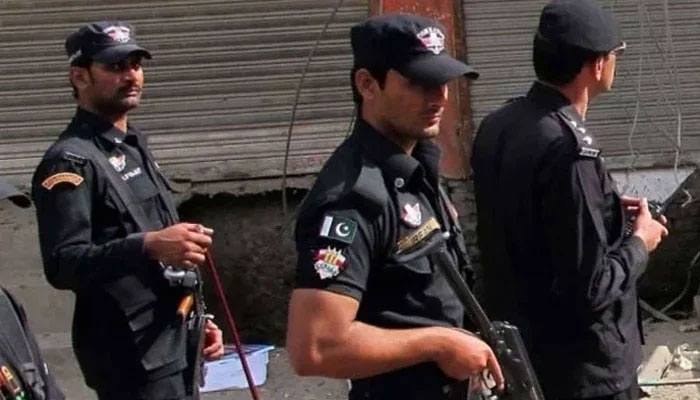A call for resources
Security challenges in KP are not abstract concerns but real, daily threats
Khyber Pakhtunkhwa has long been at the epicentre of Pakistan’s battle against terrorism – consistently exposed to threats from militant groups, many of whom find sanctuary across the porous Afghan border. The situation has only grown more dire in recent months – in fact, the past year or so. Yet, despite these increasing threats, the police force tasked with protecting the province is sorely under-resourced and underfunded. KP's newly appointed Inspector General of Police (IGP) Zulfiqar Hameed has spoken of this stark disparity recently, highlighting that despite KP facing a bigger challenge in terms of terrorism, the incentives for the police force are fewer compared to other provinces. This is not a new concern; there has been a pressing need to address the systemic issue of inadequate support for KP’s police, which is exacerbated by the growing toll of terrorism in the region. The security challenges in KP are not abstract concerns but real, daily threats. The southern districts of the province, including Dera Ismail Khan and Bannu, have been witnessing frequent attacks, including some in areas previously considered relatively stable, like Karak. Meanwhile, Kurram, another volatile district, remains a hotbed of conflict. The demand for a police force with better weapons, improved infrastructure and higher incentives is practical and important because without adequate support, the force will not be able to meet the growing demand for security. The situation in KP is exacerbated by the fact that the province has the highest number of martyrdoms among its police forces over the past two decades, but it's compensation and welfare packages remain the lowest. While IGP Hameed has pushed for immediate measures to rectify this, the true test will be whether these requests are met in a timely manner. The provincial government has given assurances, but assurances alone are not enough.
The KP government’s recent announcement to form a jirga to address the issue of cross-border terrorism with Afghanistan is another development in our ongoing terrorism challenge. The relationship between Pakistan and Afghanistan is deeply intertwined when it comes to security, and the failure of Afghanistan’s interim government to clamp down on terrorist sanctuaries within its borders has only intensified the threat faced by KP. The involvement of Afghan nationals in terrorist activities inside Pakistan is fact and calls for a coordinated, cross-border response. Pakistan has been immensely patient with the Afghan Taliban’s inaction but this patience is now running thin. Islamabad has repeatedly called on Kabul to take decisive action against the TTP and other militant groups, but the Taliban’s refusal to act has left Pakistan with few options but to take matters into its own hands.
While diplomacy remains the preferred route, Pakistan must protect its territorial integrity and citizens. As long as Afghanistan continues to harbor these militants, Pakistan will be compelled to act decisively in its own defence. And, given the high number of Pakistani military and civilian casualties, the rationale behind these actions is clear: self-defence. The security situation in Khyber Pakhtunkhwa is a litmus test for Pakistan’s broader security strategy. The province deserves not only better resources and incentives for its police force but also stronger regional cooperation to stem the tide of cross-border terrorism. If these issues are not addressed with the urgency they deserve, the consequences will continue to weigh heavily on the people of KP and, by extension, the entire country. It is time for all stakeholders – whether it be the provincial authorities, the federal government, or Afghanistan itself – to finally recognise that terror anywhere is terror everywhere.
-
 Princess Beatrice, Eugenie Are ‘not Innocent’ In Epstein Drama
Princess Beatrice, Eugenie Are ‘not Innocent’ In Epstein Drama -
 Reese Witherspoon Goes 'boss' Mode On 'Legally Blonde' Prequel
Reese Witherspoon Goes 'boss' Mode On 'Legally Blonde' Prequel -
 Chris Hemsworth And Elsa Pataky Open Up About Raising Their Three Children In Australia
Chris Hemsworth And Elsa Pataky Open Up About Raising Their Three Children In Australia -
 Record Set Straight On King Charles’ Reason For Financially Supporting Andrew And Not Harry
Record Set Straight On King Charles’ Reason For Financially Supporting Andrew And Not Harry -
 Michael Douglas Breaks Silence On Jack Nicholson's Constant Teasing
Michael Douglas Breaks Silence On Jack Nicholson's Constant Teasing -
 How Prince Edward Was ‘bullied’ By Brother Andrew Mountbatten Windsor
How Prince Edward Was ‘bullied’ By Brother Andrew Mountbatten Windsor -
 'Kryptonite' Singer Brad Arnold Loses Battle With Cancer
'Kryptonite' Singer Brad Arnold Loses Battle With Cancer -
 Gabourey Sidibe Gets Candid About Balancing Motherhood And Career
Gabourey Sidibe Gets Candid About Balancing Motherhood And Career -
 Katherine Schwarzenegger Shares Sweet Detail From Early Romance Days With Chris Pratt
Katherine Schwarzenegger Shares Sweet Detail From Early Romance Days With Chris Pratt -
 Jennifer Hudson Gets Candid About Kelly Clarkson Calling It Day From Her Show
Jennifer Hudson Gets Candid About Kelly Clarkson Calling It Day From Her Show -
 Princess Diana, Sarah Ferguson Intense Rivalry Laid Bare
Princess Diana, Sarah Ferguson Intense Rivalry Laid Bare -
 Shamed Andrew Was With Jeffrey Epstein Night Of Virginia Giuffre Assault
Shamed Andrew Was With Jeffrey Epstein Night Of Virginia Giuffre Assault -
 Shamed Andrew’s Finances Predicted As King ‘will Not Leave Him Alone’
Shamed Andrew’s Finances Predicted As King ‘will Not Leave Him Alone’ -
 Expert Reveals Sarah Ferguson’s Tendencies After Reckless Behavior Over Eugenie ‘comes Home To Roost’
Expert Reveals Sarah Ferguson’s Tendencies After Reckless Behavior Over Eugenie ‘comes Home To Roost’ -
 Bad Bunny Faces Major Rumour About Personal Life Ahead Of Super Bowl Performance
Bad Bunny Faces Major Rumour About Personal Life Ahead Of Super Bowl Performance -
 Sarah Ferguson’s Links To Jeffrey Epstein Get More Entangled As Expert Talks Of A Testimony Call
Sarah Ferguson’s Links To Jeffrey Epstein Get More Entangled As Expert Talks Of A Testimony Call




